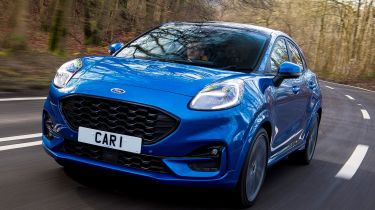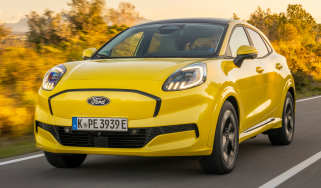Ford Puma and Volkswagen on top as UK car sales jumped in 2023
The Ford Puma was the UK’s best selling car in 2023 with Volkswagen the biggest selling car brand as the market bounced back...

Ford reclaimed the position of Britain’s best selling car in 2023 according to data just released by SMMT (Society of Motor Manufacturers and Traders). However, it’s now the Ford Puma that sits at the top of the car registrations league table rather than the Fiesta, following Ford’s decision to stop production of its supermini last year. Just shy of 50,000 Pumas were registered in the UK in the last 12 months.
In second place was 2022’s biggest seller, the British-built Nissan Qashqai, with 43,319 registrations, while 2021’s biggest seller, the Vauxhall Corsa, took third place with 40,916 registrations. The Kia Sportage and Tesla Model Y round off the top five, with SUVs dominating – seven of the top ten are SUVs by our catagorisation, although SMMT actually classifies the Puma as a supermini, claiming that category still remains Britain’s favourite type of car.
Volkswagen is the UK’s favourite car brand
However, despite Ford registrations jumping 13.6 per cent in 2023, Volkswagen still sold more cars overall making it Britain’s biggest-selling car brand. In total 162,085 VWs found homes last year, just over 18,000 more than Ford. Audi claimed third place overall ahead of BMW, Toyota and Kia rounding off the top five.
In total, 1,9 million new cars were registered in 2023 up 17.9 per cent on 2022 and the best year since 2019, as the pandemic hangover and supply shortages due to the component crisis eased throughout last year. SMMT chief executive Mike Hawes told Auto Express, “2023 was a year that’s been very positive for the UK, not only in terms of car sales, but also investment attracted, backed by government.” Major investment announcements included those by JLR, Stellantis, BMW/MINI and Nissan.
The majority of car sales growth came from the fleet sector, rising by 38.7 per cent year-on-year, although that number includes the increasing number of private car owners leasing their cars through salary sacrifice schemes and those leasing through the UK’s largest fleet, Motability. Traditional private buyer registration numbers remained static.
Electric car market share growth slows
However, it was a mixed year for battery electric vehicles. Although sales reached record levels with 315,000 full EVs finding homes, there was no growth in market share which remained static at 16.5 per cent. With 30 to 40 new fully electric models arriving in the UK in 2024, according to SMMT, that figure is predicted to rise to 22.3 per cent, in line with the government’s ZEV Mandate, which came into effect on January 3. In total, SMMT predicts a modest rise in car registrations this year, with close to two million cars expected to find homes in 2024.
Plug-in hybrid vehicles saw a surge in registrations in 2023, up 39.3 per cent with PHEVs now accounting for 7.4 per cent of the new car market. Registrations of full hybrids also jumped by 27.1 per cent to give these self-charging models a 12.6 per cent market share. Diesel market share slipped to just 7.5 per cent.
SMMT used the announcement of 2023 registrations to call on government to support private buyers in the transition to EVs with a reduction in VAT on new all-electric models. “The challenge for 2024 is to deliver a green recovery,” said Mike Hawes. “Government has challenged the UK automotive sector with the world’s boldest transition timeline and is investing to ensure we are a major maker of electric vehicles. It must now help all drivers buy into this future, with consumer incentives that will make the UK the leading European market for ZEVs.”
SMMT wants to see a halving of VAT on EVs to ten per cent, “More drivers would upgrade their existing petrol or diesel car to a new zero emission alternative, widening the future supply of used electric vehicles, and making investment in chargepoint rollout even more compelling,” said Hawes.
“Over the past five years, BEV uptake has risen almost 20-fold, with the Treasury reaping a VAT windfall due to these vehicles typically having higher purchase costs than their ICE counterparts. Halving VAT would give consumers an estimated additional £7.7 billion in BEV buying power to the end of 2026, while reducing the Treasury’s tax take by just 22% per vehicle for each additional driver switching from an ICE to a BEV. This would encourage an extra 270,000 new car buyers in Britain to go electric and put 1.9 million new EVs on the road by the end of 2026. Such a step would have a profound impact on the UK’s carbon footprint, reducing road vehicle emissions by more than five million tonnes cumulatively over the next three years.”
Britain’s top-selling cars 2023
| Rank | 2023 preliminary total | Units |
| 1 | FORD PUMA | 49,591 |
| 2 | NISSAN QASHQAI | 43,319 |
| 3 | VAUXHALL CORSA | 40,816 |
| 4 | KIA SPORTAGE | 36,135 |
| 5 | TESLA MODEL Y | 35,899 |
| 6 | HYUNDAI TUCSON | 34,469 |
| 7 | MINI | 33,385 |
| 8 | NISSAN JUKE | 31,745 |
| 9 | AUDI A3 | 30,159 |
| 10 | VAUXHALL MOKKA | 29,983 |
How much is your car worth? Find out with our free valuation tool...
Find a car with the experts








